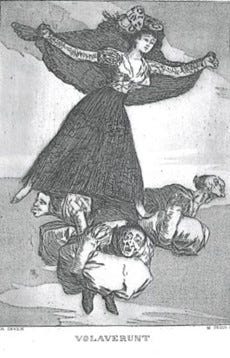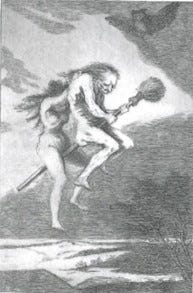volaverunt
en el mundo de Goya, como en el nuestro, para poder seguir viviendo hasta el cuerpo se facilita si la bella mariposa se transformó de gusano a crisálida y pudo tener alas, porque no una niña en esta tierra informe donde su única manera de volar es en brazo de hombres que solo buscan un lugar cálido para desaguar sus deseos de presunción para continuar sus planeos donde no miraran detrás a ver a quienes sacrificaron, solo quieren seguir adelante ellos no pensaron lo posible de este vuelo in Goya’s world, like in ours to be able to continue living even the body becomes the offering if the beautiful butterfly transformed from worm to chrysalis and grew wings, why not a girl in this uneven sphere where her only way to take wing is in the arms of men who only seek a warm place to vent their desires of presumption to continue their plans they won't look back to see who they sacrificed, they only want to continue forward and didn’t imagine the possibility of this flight
Linda Maestra, Vuela
porque no hay otro remedio que volar en la escoba de astilla hecha por el hambre tal vez la Linda Maestra sufre— sabe adónde lleva a su cordera al conocido altar del sacrificio para ellas ayer igual que hoy, hay que comer, aunque la comida le cuesta las alas al búho Pretty Teacher, Fly because there is no other way than to fly on the brooms set by hunger maybe the Pretty Teacher suffers she knows where she takes her lamb the well-known sacrificial altar of a bed for those of yesteryear as it is today— the need to nourish can costs the owl its wings
From the author:
The Spokane Library has a rare collection of early reproductions of Goya's work. Among them, Los Caprichos. I have always been interested in Goya's work, especially this later work. His political commentaries are just as relevant today as they were during his time.
Amelia Díaz Ettinger is a BIPOC poet and writer working in Eastern Oregon. She has five books of poetry and has published in many journals, magazines, and periodicals.




